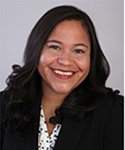
Gloria Felix is a fourth-year medical student at Michigan State University College of Human Medicine. She is one of the AAMC OSR Representatives for MSU CHM. Throughout medical school she has continued to mentor premedical and medical students. She wishes to continue her mentor role as an Emergency Medicine Physician.
I was talking to my friend on the phone a few months ago, and they asked “How are you doing? I answered, “Oh, I’m studying for my board exam, preparing paperwork for some rotations — the same old, same old.” The response from my friend was, “That sounds great, but I didn’t ask about how school is going. I asked how is Glo Glo doing?” The response surprised me and lingered on my mind for days. It made me think about how easy it is to become so focused on one aspect of our lives — like the identity of medical student — that we forget to acknowledge and nurture ourselves as whole people. Suddenly, it made me self- aware and caused me to ask myself, “How am I doing?” There are so many aspects that define us as individuals.
Medical school challenges you on an intellectual, emotional, and technical level. The time and commitment you give to medicine is only fully understood by the peers sitting beside you. As an out of state student, I left behind my family and friends to pursue my dream of becoming a doctor. In my experience, you will start to decline invitations to the weddings, baby showers, and birthdays of your closest friends and family. You will soon see more of your study group, classmates, faculty, and anatomy donors than you see of your loved ones. That’s a reality that most medical students face. It’s the reality that unites us and overwhelms us. In a very literal sense, my classmates, mentors, and wellness office are the closest family members I have.
These sacrifices begin to take a toll on you. It’s easy to feel as if you are separated from the outside world because you have dedicated yourself to becoming a healer. You’re surrounded by constant exams testing your clinical knowledge and patient cases that motivate you and remind you why you are on this path. These experiences are what we share and find camaraderie in.
The medical school experience is like no other. It’s difficult to find the words that can fully illustrate the experience to someone who has not gone through it. My classmates have become my adopted family. We have spent Thanksgivings, 4th of Julys, Memorial Days, and Christmases together. We have cried, laughed, and stressed together. I have been very fortunate to have them. The phrase “It takes a village” takes on an entirely new meaning. It’s essential for survival on this journey. I cannot stress enough how important it has been to build a supportive relationship with my peers, residents, and mentors. Our families have become supportive of each other while they cheer for our success. It’s a beautiful thing to witness.
Life doesn’t stop because you are in medical school. Illnesses, deaths, and hardships occur. We have mourned together, healed together, and continue to push forward together. My step 1 study period was absolutely grueling, which many second-year students can relate to. The night before my exam I felt the nerves and insecurity begin to creep in. I was sitting by my window in the living room, on my comfy neon-green inflatable chair trying to watch tv, but I couldn’t focus. My phone rang. “Hello?” I answered. My classmate quickly responded with, “I’m downstairs, let me in.” She showed up with my favorite cheesecake with strawberries on top from the farmers market and said these simple three words: “You’ve got this.” That moment brought a sense of calm that I will be forever grateful for.
During my first clerkship rotation I was standing outside of the OR feeling completely overwhelmed, like a fish out of water. I was stressed because I kept thinking about a lot of things: the shelf exam, how to do a one-handed knot, where I’m supposed to stand, and the fact that I had not visited my family in months and was beginning to miss them terribly. All these thoughts must have been visible on my face because the resident who was standing next to me as we were scrubbing in said, “I’m here to help. You will be ok. If you need anything, feel free to talk to me. I will help in any way I can.” I was so moved by this, and again, a sense of calm overcame me. In that moment when we finished scrubbing in, I smiled and walked over to the operating table feeling supported and ready to be part of the team.
I am sharing these experiences so that we can all realize how powerful our words are. Gestures toward your colleagues have an impact. We need to support and care for one another. Extend a hand, an ear, a meal, or a simple “Hello” and smile to the person standing next to you in anatomy lab or in the hospital. You may be able to bring that sense of calm, optimism, and warmth that’s needed in that moment.
Let’s build an environment where we show compassion towards one another and care for each other so that we can better care for our patients.
Before we ask, “How was the exam/procedure?” or “When is the next assignment due?”, let’s start to practice beginning the conversation with “How are YOU?”
Gloria Felix
MD Candidate 2020
Michigan State University College of Human Medicine
AAMC OSR Representative- Central Region